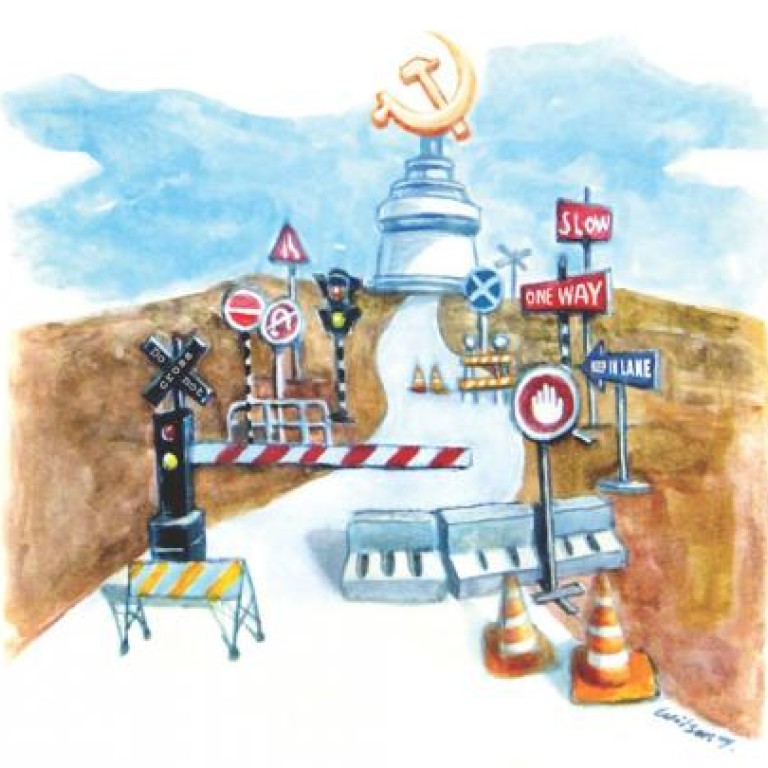
Communist Party's well-planned route to successful rule
Zhengxu Wang says the Communist Party is able to rule successfully, and maintain public confidence, thanks to its highly organised structure and meticulous preparations ahead of key events
China's microblogosphere before and after the 18th party congress appeared markedly different. Before, loud voices demanded democracy, predicting that the Communist Party would drop its Mao Zedong Thought tenets and ridiculing the party's opaque power politics in light of the recent US election.
But the day the new leadership was unveiled, microblogs seemed filled with genuine expressions of satisfaction and excitement. Netizens appeared pleased by the new line-up, thankful that Xi Jinping and Li Keqiang had been chosen to lead the nation, and impressed by Xi's approachable image. They also respected Hu Jintao's decision to retire completely.
This is a reminder that, like it or not, the party still enjoys a fairly high level of public support. Yes, discontent is widespread because of local government failures and abuses, and demand for political change and democracy is rising, but the general public remains relatively confident in the party's ability to drive the nation forward.
A key factor explaining the party's continuing ability to rule lies in its institutions. This is not a loosely organised party that only works towards obtaining people's political donations and votes at election time. The elaborate body of party institutions governs recruitment, indoctrination, performance evaluation and profiling, promotion, cadre transfer, leadership selection, deliberation, decision making, discipline and other aspects of party life.
Party cells, for example, exist in every workplace, organising members to study the party's ideological and policy lines regularly and intensively. This unifies thinking among party members and ensures that policies set at the top are effectively transmitted to and understood by those on the ground.
The party congress itself represents one of the most important of these institutions, serving two main purposes: to unify the party in terms of policy thinking and direction, and to rejuvenate the top bodies of leadership.
Although the party congress is held for only one week every five years, work has actually been going on through the party rank and file for more than 18 months beforehand. Preparation of the political report, for example, involves countless rounds of consultation and deliberation.
Prior to the party congress, provincial- and city-level congresses are held, setting policy directions for their respective localities and replacing the leadership office corps there. Tens of thousands of officials are assessed, promoted, appointed or reappointed, transferred, replaced or retired, in accordance with elaborate rules and procedures.
So what the outside world saw at the 18th party congress in Beijing last week was only the tip of a gigantic iceberg. Hu's political report to the congress might have been seen as boring because it featured nothing new. But that was exactly the point: a consensus on policy and ideological lines had already been achieved prior to the event.
How the new Politburo and its Standing Committee were selected attracted more attention among the general public. Speculation beforehand was high.
But a review of the party institutions showed that there was never room for big surprises in the selection of new members. The elaborate system of cadre promotion meant that potential candidates for the vacant seats were obvious even before the final deal was struck.
This time, for the five vacant seats on the Standing Committee, just seven or eight candidates could claim to have had a realistic chance. Thus, contrary to speculation about the "daunting task" of selecting the members, it was just a matter of picking five out of the seven candidates.
Despite the long process of deliberation and horse trading that started last year, it seemed the eventual choices were made quite easily: they were based simply on relative length of service in the higher-ranking offices.
Among the five new members of the Standing Committee, Zhang Dejiang, Yu Zhengsheng and Liu Yunshan had served two terms in the Politburo. The other two, Wang Qishan and Zhang Gaoli had each been on the Politburo for just one term. But Wang had already served one term at a deputy state-level position (as a vice- premier) and Zhang, seen as the weakest of the five, had also been on the Central Committee for two terms.
In contrast, the two hopefuls who lost out, Li Yuanchao and Wang Yang, had weaker records. Although both had been on the Politburo for a term, neither had equal or longer service records on the Central Committee than Zhang.
To emphasise the institutional effect, the very fact that all these candidates had made it to such a high level indicated they are more or less equally competent and have very similar political beliefs.
Really, it's useless to hope that one may be a reformist or a liberal; they are all of the same mould. It would have made little difference whoever among the seven got the five seats, although we may hope differently.
Nonetheless, institutional deficiencies still haunt the party. A lack of effective anti-corruption institutions means graft is widespread in the party, and succession politics has been marred by a lack of transparency and predictability, together with a heavy influence of the old guard.
Too many party elders were included in the congress' formal institutions, such as its preparatory committee and presidium, and their views were given too much weight. That certainly tilted the congress more towards stability and conservatism than towards change and liberalism.
Yet, Hu's full retirement can be viewed as a big service to the party as it will greatly diminish the old guard's role in China's leadership politics. Indeed, if retired leaders are not included in the next congress' formal institutions and do not participate in personnel and policy deliberations, the party will probably have a better future.

